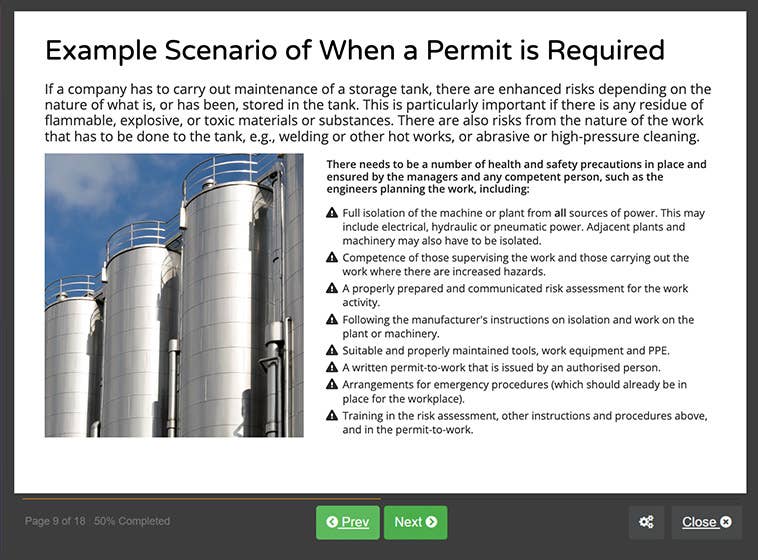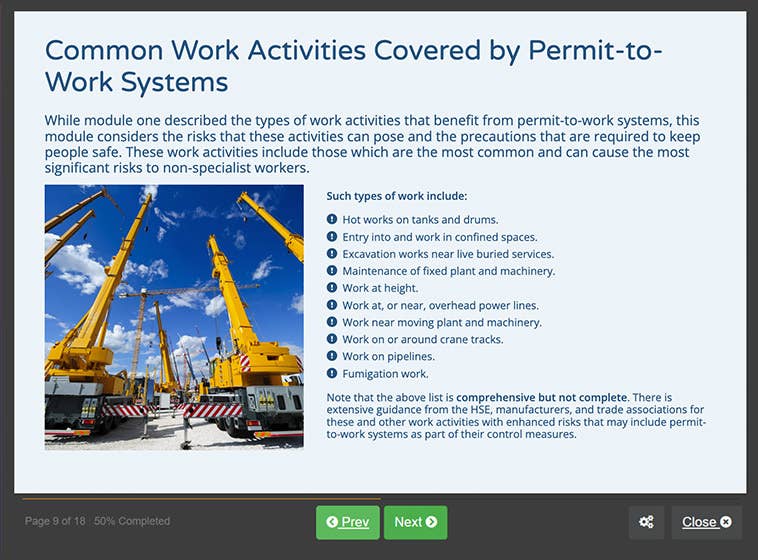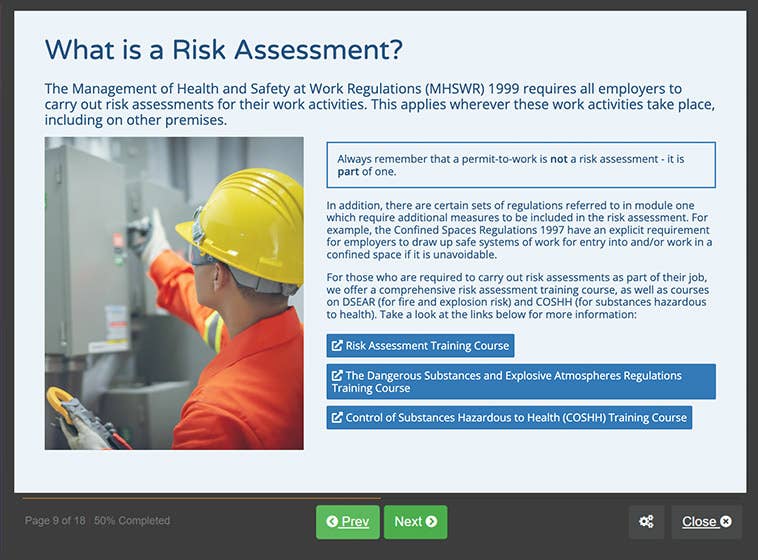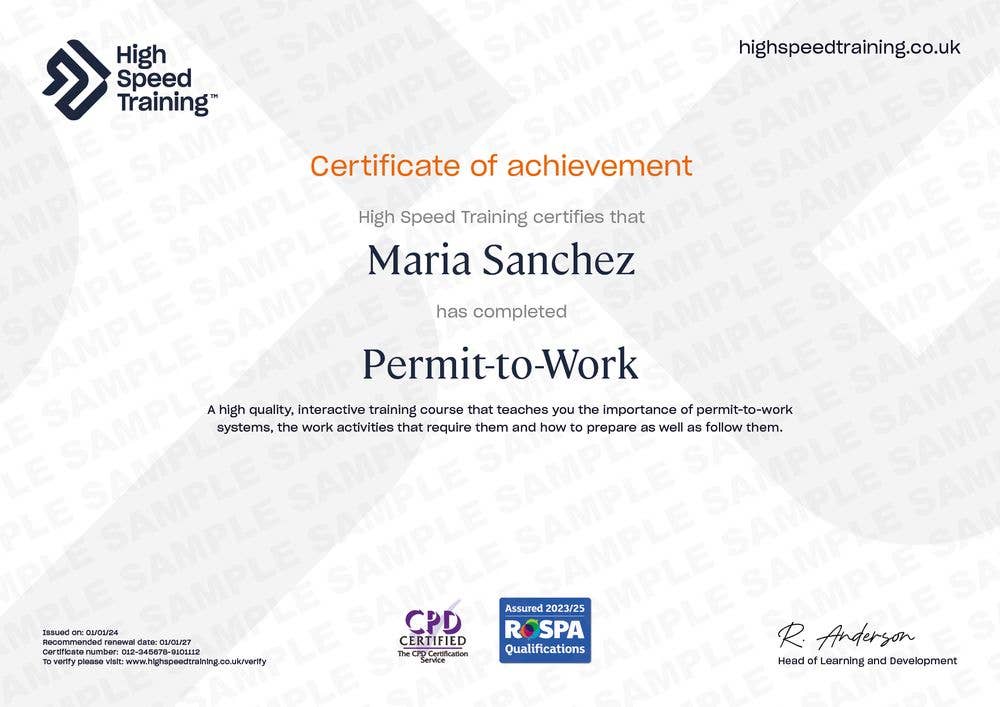Permit-to-Work Training
Quantity: 1

Duration 1-2 hours



100% online training
Start when you like
Learn on any device (desktop, mobile or tablet)
Instant assessment and result
1 learner per course
Train teams of all sizes
Bulk discounts starting at 10% off 10 courses
Pay by invoice with 30 day payment terms available (5+ courses)
Includes a 10% discount for 10+ courses
Permit-to-work systems are necessary for high risk activities and those that may compromise existing safety procedures. As a result, if you work in an industry that often carries out high risk work, it’s crucial that you know what a permit-to-work is and what it should cover.
This course will explain the purpose of permit-to-work systems and what type of high risk activities may require them. It covers what sections a permit should contain, who has the responsibility for preparing them, and the duties of everyone who will need to carry out work covered by a permit. On completion of the course, you will understand how to prepare a permit, or how to follow it if your workplace receives one, so you can ensure everyone carries out high risk work safely.
100% online training
Access anywhere
Same day digital certificate
Printed certificate posted next working day
Full audio voiceover
Assessment retakes at no extra cost
Written in compliance with UK legislation and guidance
Developed by health and safety professionals
Accredited by CPD and assured by RoSPA Qualifications
Bulk discount for orders of 10+ courses

Save on our courses when you buy more training upfront. Lock in a better price now and access the training whenever you need to. You can mix and match any of our courses too and get the discount off your whole order.
10+ courses = 10% off
50+ courses = 20% off
100+ courses = 30% off
500+ courses = 40% off
By the end of this course, you will:

Accredited by CPD
All of our courses are accredited by the CPD Certification Service as conforming to universally accepted Continuing Professional Development (CPD) guidelines.

Assured by RoSPA Qualifications
This course is also assured by the Royal Society for the Prevention of Accidents through their RoSPA Qualifications Assurance System, as providing up-to-date, quality and content-approved training.
Recommended renewal:
3 years
What does this mean? This certificate does not have an expiry date, however, based on industry best practice guidelines there is a recommended renewal period.
Our in-house Learning Designers develop all of our courses to give you and your learners the most engaging training possible.








The hierarchy of controls, the position of permit-to-work systems in the hierarchy of controls, what is a permit-to-work, what are the key principles in a permit-to-work, what types of work may require a permit-to-work, when should permit-to-work systems be used, who should take responsibility for the preparation and issuing of permit-to-work systems, why are permit-to-work systems important, health and safety law, and the Health and Safety Executive.
What is a risk assessment, who should carry out a risk assessment, the role of safe systems of work and permit-to-work systems in risk assessments, principles of a model permit-to-work, permit title and reference number, job location, duration of permit, including date and time and extension or shift handover, plant or equipment to be worked on and description of work to be done, hazard identification and precautions required, emergency arrangements and monitoring equipment, personal protective equipment, issue and acceptance of permit-to-work systems, extension of permit-to-work systems, and hand back and cancellation of permit-to-work.
Common work activities covered by permit-to-work systems, examples of work occupations involved, safe place of work, safe work equipment and safe plant, hot works on tanks and drums, isolation of plant and machinery, isolation of plant and area of work, training and competence, supervising and carrying out work under a permit-to-work, monitoring permit-to-work systems, display and cancellation of permit-to-work systems, and emergency arrangements.
The online assessment is taken on completion of the training material. You will be asked 15 multiple choice questions with a pass mark of 80%. The answers are marked automatically so you will instantly know whether you have passed. If you don't pass don't worry! You can take the test as many times as you need with no extra charge.
Our Permit-to-Work Course is designed for anyone who will be creating and issuing permits, as well as those who will supervise or carry out the work covered by a permit. It explains the duties of everyone responsible for the permit, from the point of issue to the work’s completion.
Anyone who carries out high risk work, such as in confined spaces, working at height, asbestos work, hot work, railway maintenance, and more, should take this training.

In partnership with
Neil Murray
Health and Safety Consultant
Neil Murray is a vastly experienced and highly qualified health and safety professional who has held roles such as Senior Health and Safety Executive inspector, and Principal Inspector for Channel Tunnel construction. He has also held senior roles in an international infrastructure business, a major UK water utility company and a major construction group and provided management consultancy to numerous companies across a wide range of industries.
Neil has a wide expertise in many sectors, including construction, civil engineering, manufacturing engineering, water and waste utilities, education, heritage sites, public safety, rail construction and operation, transport, marine, waste management, engineering design and industrial and facilities management services.
Neil is a QSA auditor for RoSPA and also an author of published guidance on health and safety in the construction of the Channel Tunnel, work at height, major project management, and online training courses.